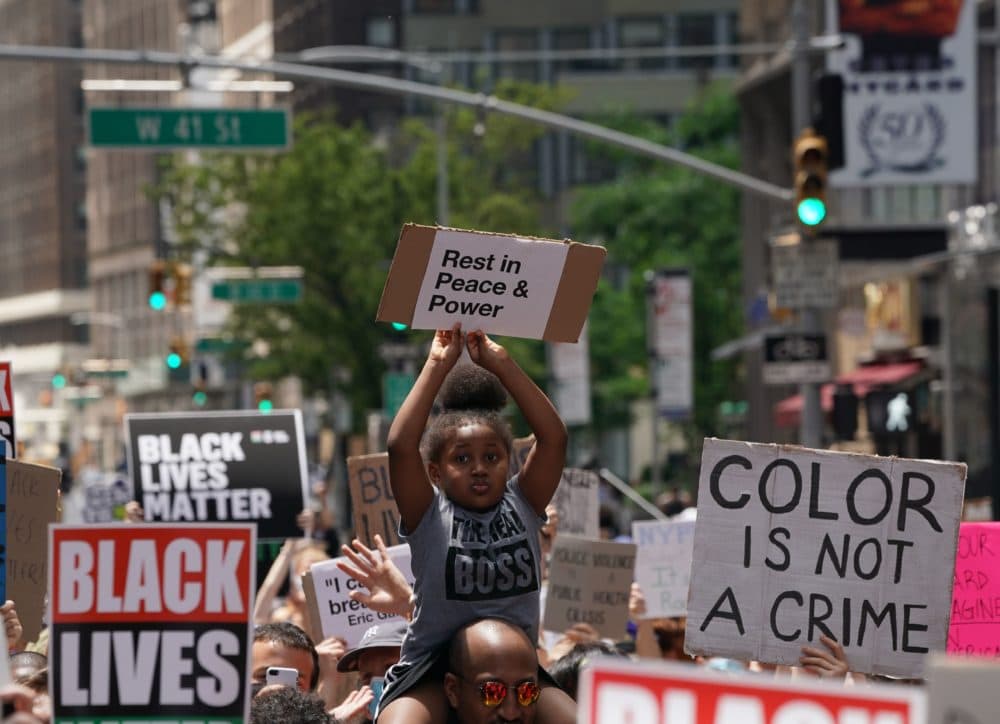Advertisement
How To Talk About Race And Protests With Your Kids, Explained By A Child Psychologist
Resume
Many families are bringing their children to protests against police brutality sparked by the killing of George Floyd.
In New York, Wynta-Amor Rogers went viral after her mother posted a video of the 7-year-old furiously waving her finger and chanting at a protest march.
Little kids are a big part of this moment, but how should parents talk to them about it?
For Black parents of Black children, it’s important for them to “affirm the humanity of their children” when talking about what happened to Floyd and police violence against Black people, Dr. Beverly Daniel Tatum says. Tatum is a child psychologist and author of "Why Are All The Black Kids Sitting Together? And Other Conversations About Race.”
Parents need to assure their children that they are doing everything they can to keep them safe, she says. This is a difficult task because when Black children see the Floyd video — a Black man killed by a white police officer — they will identify with Floyd.
“Maybe you are not necessarily thinking, 'Oh, that could have been me,' because you're a child, but, 'It could have been my dad.’ That's a scary thought,” Tatum says. “So parents have to both acknowledge the anxiety, the fear and the fact that these things have happened, and we are all working very hard to make sure they don't happen in the future.”
White parents need to talk to their white children about race and racism, too, Tatum says.
“Many white parents think that if they don't talk about race or issues of prejudice, their children won't have any,” she says. “But the fact of the matter is, the negative stereotypes are part of the air they're breathing.”
She suggests parents read books with their preschoolers that feature children of different backgrounds. Books like "Something Happened in Our Town: A Child's Story About Racial Injustice” can also spark conversations between parents and young children about fairness.
Parents should also talk to their white children about how to be an ally and share stories of white people who have marched in solidarity with Black people in the past, Tatum says. Jeanette Winter’s "Follow the Drinking Gourd" tells the story of white people who assisted slaves on the Underground Railroad.
“White children don't want to always be portrayed as victimizers,” she says. “They want to also understand that there's a role for white people to be working against victimization as allies.”
More From The Interview
On how Black parents can talk to their children about staying safe
“If you're talking to a 3-year-old or a 4-year-old, the odds are you can keep them safe. They want to know that their parents are there to support and care for them. And 99% of the time, that is true for a preschooler because they're rarely out alone. If you're talking to an older child who is out on the streets alone, then that conversation needs to be different.
“Black parents often refer to what is colloquially known as, quote, the talk. And that child needs to understand when a police officer asks you a question, you must always be polite, must always keep your hands visible, so they don't think you're reaching for a weapon. And even if it feels like it's not fair, I need you to remember this so that you don't accidentally get hurt or worse yet, killed. Who wants to tell their child that someone who's supposed to help them might actually hurt them?
“We know that there are police officers who'd want to help people, but just as most people are good hearted, there are people who will sometimes mean you harm.”
On how parents can give their children hope by taking them to protests
“One of the things that I think of is a quote from Bryan Stevenson, head of the Equal Justice Initiative and author of the book, 'Just Mercy.' And he says, ‘Injustice prevails when hopelessness persists.’ So in order for us to see and work toward justice, we have to believe that change is possible. My father was a college professor. When he wanted to earn his PhD, we were living in Florida. He couldn't go to Florida State University because of segregation. That's an example of change. This problem of institutionalized state violence against Black people is part of our past, and it is protest that will hopefully make it something that we can look back on as what used to happen and not what is still happening.”
On how Tatum spoke to her Black son about race when he was a toddler
“He came home and said, 'Tommy says my skin is brown because I drink chocolate milk. Is that true?' And I said, 'No, it's not true. Your skin is brown because you have something in your skin called melanin. Everybody has some. The more you have, the browner your skin is. It's actually good for you. It helps protect your skin from the sun. It happens that you're the kid at your school that has the most.' He was tickled by that. And so I went to the school and asked the teacher how they were talking about difference. She said, 'Well, you know, it really hasn't come up.' But of course, it had come up.
“There was nothing malicious about Tommy's question. He was a 3-year-old trying to figure something out. But when we are too embarrassed or reluctant to respond to the preschooler's question, we convey there's something wrong with that skin. That's why we can't talk about it. And that sets the seeds for the assumptions of supremacy. We don't want that.”
Marcelle Hutchins produced and edited this interview for broadcast with Peter O'Dowd. Samantha Raphelson adapted it for the web.
This segment aired on June 10, 2020.
